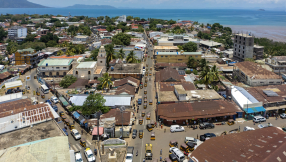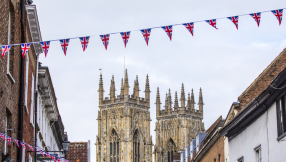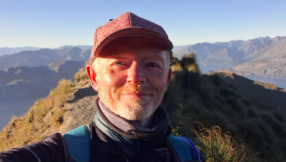
This year the Naked Truth Project (NT) celebrates 10 years of opening eyes and freeing lives from the damaging impact of pornography. The organisation, based in Manchester, has been recognised widely for the work it does to break the cycle of porn addiction and bring restoration to the lives of many.
Christian Today spoke with Ian Henderson, founder and CEO, to hear about how the church has been tackling pornography over the last decade, new challenges with the rise of AI, and what parents can do to safeguard their children from adult content.
NT set out to 'open eyes and free lives from the damaging impact of pornography through awareness, education and recovery programmes.' Do you think the Church is more aware of the problem 10 years on and have churches got better at discussing and addressing porn addiction?
Yes, I think we have definitely seen change. I certainly remember over 10 years ago when we began having some conversations and doing a few pilot initiatives to see what response that might have. In those early days, I think talking about pornography in the church context was taboo - no one even wanted to hear the 'P' word being said. By contrast in mainstream culture it was becoming taboo to even suggest there might be anything harmful about pornography.
Since then, thousands of leaders have attended our conferences and events, and 10 years on we are still engaging with churches that want to talk about and tackle this issue. Increasingly, we are being asked by theological colleges and Bible colleges to come and speak to leaders in training about this issue. I think that's quite significant because it may be that one of the reasons why porn was so difficult for churches and church leaders to address was because they didn't feel trained and equipped to talk about it.
As many as 93 per cent of church leaders identify that porn is a significant problem in their congregation, but only 7 per cent of church leaders have any programmes or ways to support people. There is a big gap there - or there was - and I think we are seeing that gap beginning to close.
I also think that we are seeing changes in wider society as well. A few years ago it was taboo to suggest that porn was harmful, but I think more and more people are beginning to recognise the addictive nature of porn and the negative impact it might have on relationships and young people's understanding of relationships. The Online Safety Bill was recently passed here in the UK which I think is a reflection of people beginning to understand that we need to protect young people around this issue.
The rise of AI has created a new sector within pornography, 'deep fake' porn. Is a new strategy needed to address these emerging challenges?
For us as a charity the majority of our work is education and recovery so, we're helping those that are struggling with the impact of porn on their lives, or the lives of their loved ones. The reality is that while the kinds of porn that people consume or download may change, what remains the same is its destructive nature. It's still something that is unrealistic and creates toxic views of others.
A dictionary definition of porn would define it along the lines of writings, pictures and films that have been designed to stimulate sexual desire, often for profit, so even in that dictionary definition you have a 'what' and a 'why'. The 'what' could be films, magazines, or a deep fake AI-generated picture, or it might be a hand drawn anime manga cartoon. The 'what' can look different but the 'why' remains the same - creating something to stimulate sexual excitement in order to generate a profit. The porn industry is still seeking to leverage people's vulnerabilities, their brokenness and weakness, to make money. That is why we as an organisation often talk about rescuing people downstream who are drowning. People will be drowning regardless of how the porn is actually created.
Having said that, a small percentage of our work is in partnering with and supporting organisations who work primarily around changing legislation and law. There is a lot of work happening in that space, including around the question of whether there needs to be some legislation for AI.
What are your thoughts on age verification controls on porn sites?
I think it's been a long time coming. It's frustrating that it took so long, but we can celebrate that age verification has finally passed into law. The question now is to see how well it's regulated by Ofcom.
It's important to understand that this is about protecting young people. It's not a conversation about consenting adults and freedom; it is an agreement that young people under the age of 18 shouldn't accidently be exposed to porn. We should be able to have things in place that mitigate against that.
What can parents do to protect their children in a world where porn seems to be prolific?
It does massively depend on the age of the child but in general terms, there need to be both controls and conversations. When they are younger it is easier to have more control. When they get older, it's more about a conversation. It's helpful to think of the internet as a city and think about how parents would raise their children in that kind of environment.
My two kids grew up living in the centre of Manchester. When they were little we wanted them to experience what was good about the city. We wanted them to go to places, experience things, enjoy things and we were normally with them, making sure that they were safe. When they were crossing the road, we were holding their hands. When they became teenagers we didn't do that. They would go into town on their own and be with their friends, so it became much more about having conversations around where they were going and what they were doing.
I think the internet is a similar thing. It's natural and healthy for children to have independence in their real life and I think probably in the digital world we need to be working on that too. When they are younger we need to make sure that we are holding their hands and some parents don't know how to do that because the internet feels overwhelming to them. We have a parents' pack with lots of advice about how parents can put in some controls when with younger children and have conversations if they are older. That would be a good starting point for lots of parents.
We would also encourage parents to have a conversation with the whole family in which they reach an agreement about each other's digital use. That can help teenagers particularly because it makes it less about them.
You've reached your 10-year milestone. What's next for NT?
We hope to be able to continue the work we are doing because it is needed now more than ever. We have already engaged with around 100,000 pupils in schools but we want to talk to more schools and more young people, and in other countries, not only the UK, because the problem is so huge - 56 billion hits on one porn site in one year tells me 100,00 pupils in 10 years isn't quite enough yet!
That's another reason why it's important that our resources are accessible to people, whether they have a faith or not. What we've seen is that as people start their recovery, they also start exploring and coming to faith because they've joined a community where there are Christians who are often struggling with the same thing. I'd love to see more of that.
We are inspired by Isaiah 40's language of 'levelling mountains, lifting valleys, preparing the way for the Lord, clearing a way so that the goodness of God could be revealed to all people.' Pornography is a mountain that needs to be levelled. Our part is to ask how we can stand against this huge giant of pornography, and see more people discover - or rediscover - God.













